The general feeling around Ant-Man has been one of apathy from MCU (Marvel Cinematic Universe) fans, and it’s not all that surprising–with so many hits in the can, the world has been waiting for the Marvel mega-machine to falter. That said, Ant-Man is a truly enjoyable ride full of comical performances.
It’s just isn’t necessary.
The biggest stain on Ant-Man‘s production was the prolonged goodbye from writer/director Edgar Wright (of Shaun of the Dead, Hot Fuzz, and Scott Pilgrim fame), the first person tapped for the project. Wright’s falling out with Marvel was a lengthy, painful thing, clearly the result of everyone trying and then trying again to make it work well past the point of failure. It seems likely that Wright’s primary issue was Marvel’s insistence on working so much of the MCU canon into the film, and once he departed, fans were at a loss. With every breath of promotion, Marvel was assuring moviegoers that Wright’s fingerprints were still all over the film, and from how much attention he receives in the credits, it’s clear that they were hoping to drive that home. And certainly, Wright’s sense of humor lives on in Ant-Man, a sensibility that would have been impossible to stamp out altogether.
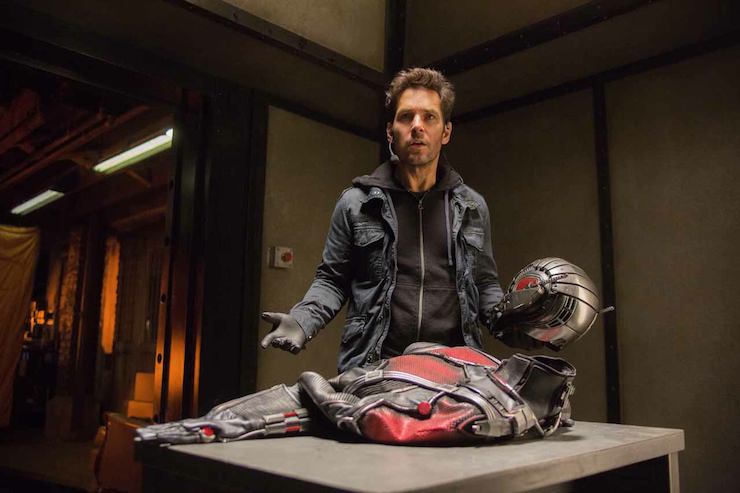
The problem is that much of Edgar Wright’s talent is situated in ways that he marries screenplays with his (unmistakable) visual directing style. Ant-Man is missing Wright’s frenetic energy–his quick cuts, his closeups on inane action, his placement of visual gags. Some of his vernacular remains–his supremely ironic song choices, for example–but it’s not enough to pull the very trite story arc out of the water.
So, as predicted, Wright’s departure did to Ant-Man precisely what everyone feared; it made the movie… just another superhero jaunt. It doesn’t help that plot is a badly rehashed first Iron Man film, right down to a bald villain that wants the Pym particle tech all for himself and his personal aggrandizement. And unlike Obidiah Stane, that villain (Darren Cross, Hank Pym’s former “prodigy”) is grossly obvious from the get-go. He might as well rub his hands together gleefully every time he walks on set for all the evil gloating he’s doing throughout the film.
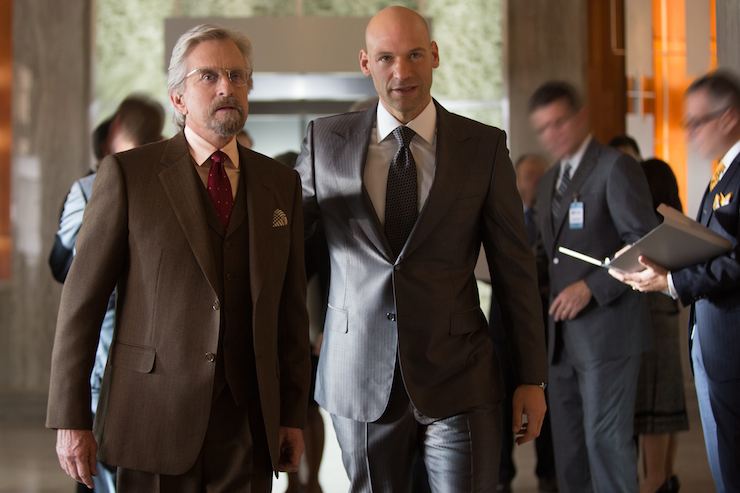
That said, Ant-Man succeeds the best in places where it lets go and tries to enjoy itself. The cast is doing an excellent job of making this little sidelined group of players into heroes worth watching, and Paul Rudd and Evangeline Lilly are charming from the first glance. (Especially Lilly, who has so much presence as Hope van Dyne, she practically forces other people out of the frame when she looks across a room.) The use of the ants is, appropriately, one of the best aspects of the film, and the little guys contribute to every action sequence with a wonderfully unique flare. Fun, too, are Scott’s heist crew, who make up the majority of the film’s laughs, and happily don’t read as boring stereotypes.
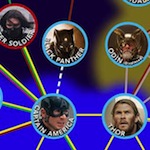
The biggest problem with Ant-Man is that, without Wright’s singular take, this movie isn’t… needed. At all. Fans of Marvel comics likely know Hank Pym (the original Ant-Man, played by Michael Douglas in the movie) for three reasons: he was a founding member of the Avengers, he created Ultron, and he infamously beat his wife within the panels of his comic. None of these elements apply in the MCU, and Ant-Man is barely required for his abilities at this point, certainly not enough to warrant an entire film on his origin. The upcoming films will work to open up Marvel’s universe in ways that are deeply relevant, and not just for the sake of diversifying the cast (though that is incredibly important)–Black Panther’s appearance will expand our world stage, Captain Marvel will undoubtedly deal with humanity’s new frontier in space, Doctor Strange will bring all that is metaphysical and weird. Ant-Man… well, he can be big and then small, and ants really like him. He’s quippy?
Oh wait, we’ve got a bunch of quippy guys already.
(Below this point will be HEAVY SPOILERS for the rest of the film. Do not go past this image if you don’t want to read them!)
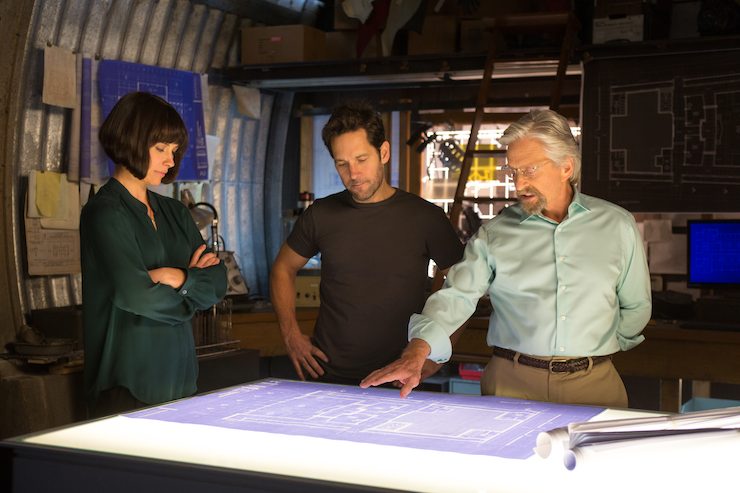
NO REALLY, SPOILERS AHEAD!
In terms of how the film plays with the already established MCU canon, it is delightful if continuity is your beat. The opening shows SHIELD as it existed in the 80s–the HQ that Cap and Company will tear to the ground in Winter Soldier is in the process of being built–and we get to see a middle-aged Peggy Carter and John Slattery’s Howard Stark again. (I desperately wanted this. Dominic Cooper gives his all in Agent Carter and Captain America, but John Slattery’s take on the part feels far more authentic to me, for all that he has played it for a mere five minutes on film.) The CGI used to age down Hank and age up Peggy is still a bit uncanny-looking, but Marvel is determined to use the technology, so I suppose there’s nothing for it.
The next nod arrives when Hank mistakenly uses old intel on one of Howard’s warehouses to fill Scott in on some tech they need to steal–without checking in to find out that said warehouse has been converted into the new Avengers training compound. Scott gets to grapple with Falcon, and Sam Wilson’s appearance is a welcome beat in the plot, reminding the audience of where we are in the Marvel universe while giving Falcon a chance to spread his wings (hur hur) a little. The use of the Cold War propaganda films as background for the Ant-Man figure feels a little wobbly, however; if Pym had been working with SHIELD, doing missions while the USSR was still around, it seems incredibly unlikely that he would have never been name-checked up until this point. Even having Cap or Coulson mention the urban legend of Ant-Man in the first Avengers film would have helped a little, but without it, the origin of the character is a silly sort of blindside.
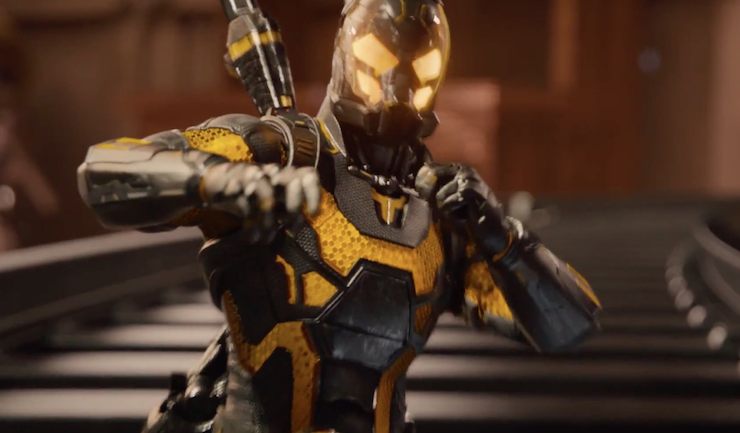
The parallels in the plot are as obvious as they could possibly get–Hank Pym is giving Scott Lang (Paul Rudd’s character is a former thief of a very literal Robin-Hood-type caliber) the chance to make his way back to his young daughter, who he can’t see following his time in prison. The actress playing Cassie Lang (Abby Ryder Forston) is a little ball of incandescent joy, so it’s easy to understand why Scott is so enamored of fatherhood. Hank wants this for Scott because he’s botched his paternal path with daughter Hope (Lilly), who won’t forgive him for keeping the details of her mother’s death from her. We later find out that Janet van Dyne was working with Hank as the Wasp, and died stopping a Russian Cold War missile.
The problem is that Hank’s grief over Janet’s death is used as the primary reason for keeping Hope out of danger–though she’s clearly more capable with the Pym tech than Scott is. Essentially, Janet van Dyne was fridged to give Hank Pym enough pain to prevent Hope van Dyne from being the main character. It would have been a much better (and unexpected) film if that hadn’t been the case. Keep Scott Lang on as the guy who teaches Hope how to be a good thief, as she’s already got the other skills down pat, and let Hope come to terms with her father’s legacy through more than just tears and a good heart-to-heart with pops. Scott Lang is a fun character, but he’s ultimately not anything special as a front man–the Marvel universe is full of guys who are just like him. His desire to be a good dad is the only thing that sets him apart and makes him interesting.
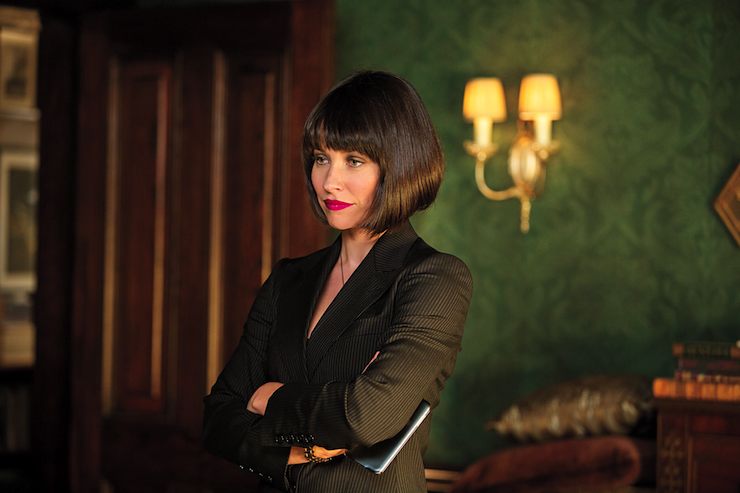
Of course, some will insist that this isn’t a problem because Hope gets her wish in the first post-credits scene of Ant-Man; Papa Hank unveils the Wasp 2.0 uniform that he’d been working on with Janet, and tells Hope that she should wear it. And Hope says what the audience has been thinking from the start: “It’s about damn time.” And in my mind, this is perfect example of how Marvel has managed to have it both ways on representation; they create excellent female characters, then come up with reasons why they cannot be the primary protagonist. Sure, Hope van Dyne will be the Wasp now, but the upcoming roles for she and Scott in the MCU will clearly be as bit players in the big tentpole films, lending a hand during the Civil War and the Infinity War arcs. Marvel figured out a way to make her a hero, but still wouldn’t allow her to take center stage. And she deserved it.
So there were two major fixes that could have made Ant-Man a special addition to the Marvel universe, but Wright was shown the door and then Hope didn’t get her due. While I can recommend the movie for a fun diversion on a hot summer day, it’s not broadening the scope of the MCU in any spectacular way. Which is honestly too bad, because it has the pedigree of something much greater between its frames.
Emmet Asher-Perrin just wants to say… that second tag scene, though. SECOND TAG SCENE. You can bug her on Twitter and Tumblr, and read more of her work here and elsewhere.










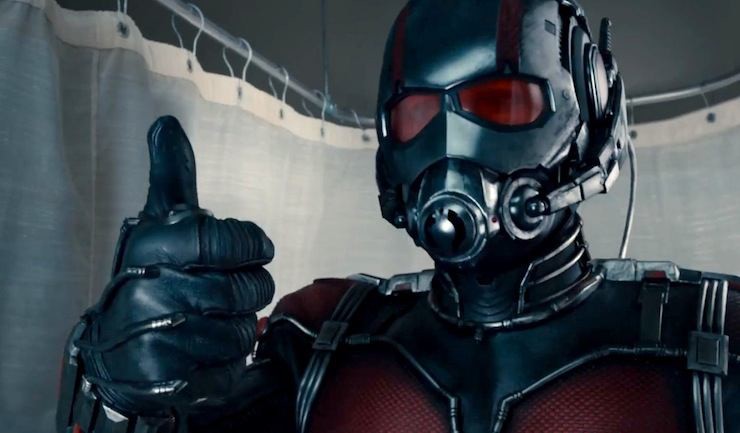
I hope it flops. Maybe then someone other than Kevin “we don’t listen to fans neener neener” Feige can start making decisions. Ant Man was his baby, every other possible expansion of the MCU was put on hold until he could get this movie.
Sounds like I was right to avoid seeing it in theaters. Sure, I’ll Netflix it eventually, but it sounds exactly as redundant as I thought it would.
Expect to see the words “redundant” and “unnecessary” more and more with comic book movies. After they’ve mined every obscure character and crossover event for all their worth, what will be the next big budget trend? Giant robot musicals? Wookiee fairy tales? Ironman vs. Boba Fett? Just put all the action figures in one sandbox, Disney.
Good review…except…
Does *every* review of a movie with a male lead now have to include a paragraph picking apart how much attention and screen time the female characters get? It’s not called “The Adventures of Hope Van Dyne” it’s called “Ant-Man”, and so therefore you would expect Ant-fing-Man to be the main character, not Hope Van Dyne. Iron Man was about Iron Man, not James Rhodes. Thor was about Thor, not Jane Foster.
@@.-@, Matthew W.
Does *every* review of a movie with a male lead now have to include a paragraph picking apart how much attention and screen time the female characters get?
How about this, when women get 51% of screen time, lines, lead roles, directing, writing, and producing credits, we’ll stop doing that.
Spoilers
I was surprised when I read this review to be informed that in the MCU Janet Van Dyne is dead the first time we hear about her. I thought this movie would introduce her character and we would see the original Wasp in the Avengers next time. I liked Janet in the Avengers cartoon.
So, I thought this movie would be something like “husband and wife are superheroes. And they fight crime together”. But then I heard and read that Janet was dead.
Then I thought this movie would be “father and daughter are superheroes. And they fight crime together”. But then I read this review and discovered that Hope doesn’t get to wear the Wasp suit not even in the after-credits scene. Just like the Iron Man first movie with War Machine. So, this is another origin story of only one superhero, and you tell me there’s even more similarities with Iron Man 1, including the villain.
So I think I’ll pass. I just wanted to see a buddy cop /superhero movie or odd couple / superhero movie. Or father-daugther-strained-relationship-that-gets-better-at-the-end/superhero movie (with both father and daughter being superheroes). You know, see more done with the superhero movie than another origin story.
Hank Pym was not a wife-beater in the comic — not intentionally, at least. It was a single panel in a single story, and it was scripted as a scene in which an emotionally unstable Hank accidentally struck Jan while gesticulating wildly. It was more that he was oblivious to her presence than anything else. But the artist’s training was to make every action as big as possible, so he rendered it as a forceful blow that knocked her down. And that one poor artistic decision in a single panel has tainted Hank’s reputation ever since.
@4/Matthew W.: But it would be impossible to talk honestly about Iron Man without talking about how much Gwyneth Paltrow steals the show. Supporting actors who give impressive performances deserve attention in a review, because no movie review is expected to limit itself to the main character to the exclusion of all others. Gender has nothing to do with it.
I saw an advance screening last night.
It was good. Not Guardians of the Galaxy good, but still fun.
Then again, I love heist movies, so I’m biased.
If you wait to see this on Netflix, I genuinely think you’re missing out. Ant-Man is smaller scale and mostly a heist flick, but it serves as a palette cleanser after the bombastic Avengers: Age of Ultron. The application of Ant-Man’s powers are visually dynamic and equal parts amusing and very creative. Paul Rudd is excellent as the affable, charming but not completely competent or confident Scott Lang, and his relationship with his daughter is completely endearing. Likewise, Michael Douglas and Evangeline Lilly dive into their roles with gusto, with their roles as mentor and grudging ally to Scott and struggling father/daughter providing for some nice character beats.
The humor can feel a little forced at times, and the pacing could have been done a little better (both things Edgar Wright is great at), but the new director expanded then of Hope and showcased a scene with Janet as the Wasp, which is excellent. And of course, the ants and the scene with the Falcon were some of the best aspects.
Necessary? Maybe not to the MCU as a whole. It doesn’t exactly have to build up the MCU too much more in Ant-Man’s origin: Age of Ultron already did that to a huge degree, much to a lot of people’s disdain. But did Marvel tell a good super-hero story with humor, heart, fun, powers that haven’t been done well (if ever) before in exciting ways? Absolutely. I’d say it’s maybe my fourth or fifth favorite Marvl film, and yet I can’t stop thinking about it, because it was charming as hell. Everyone in my theater loved it. You should absolutely at least catch the matinee.
The common “complaint” I’ve heard is that it doesn’t tie in too much into the MCU, when actually doing that was the biggest complaint against AoU and Iron Man 2. Ant-Man is certainly leaps and bounds over Iron Man 2 and Thor:TDW.
I loved it.
There were some problems with pacing and unity, likely explained by the shift in direction partway through production, but it was fun and funny and there was plenty of action. The actors did a great job. The script was strong. There were a lot of cool cinematographic moments.
I get that people are getting fatigued by superhero films, but this one is excellent. Just sit back and enjoy the ride.
The best part of the movie was definitely how well Evangeline Lily played Hope’s seething rage at being dismissed and patronized to. Sure, the movie was aware of and made a plot point about how much more ridiculously competent Hope was than Scott, but the script didn’t quite spell out how unbearably patriarchal Hank was being; he so clearly did not respect his wife or daughter as autonomous, fully formed human beings capable of making their own choices and having their own intrinsic worth and value. But, Evangeline Lily just nailed the perfect undercurrent of seething rage and frustration with being dismissed and “protected” instead of respected and trusted. It’s hard not to read it as a reflection of the real world circumstances of the film being made. “Why am I still the supporting character love interest, when I have better action credits and box office draw? Why am I not in the suit?”
It’s well worth the ticket price just to watch Evangeline walk around with murder eyes like “I swear to God, if one more man in this film tries to patronize me and put me on a shelf, then I am going to BURST FROM MY FLESHY COCOON AND DESTROY THE WORLD WITH FLAME AND BLOOD”
It was a fun movie, nothing to wow it, except being a lot more comedic and light hearted, which is something I enjoy. I expect that now that superhero movies are their own genre, this will be an above average example (ie, along the lines of Iron Man 2 perhaps) Random spoilers throughout.
I think what it did really well was to create a more immersive Marvel Cinematic Universe, where it’s not just super spies and gods running around. Also, like I said, I really like the humour bits, and Michael Pena, who’s very hit ad miss with me, worked really well in his role.
Whereit didn’t was in the Wasp. The previous Wasp appears for like half a minute, and then is left trapped as a sequel hook (or as a launch platform for a Rom:Spaceknight movie!), while the modern day Wasp, who obviously would make a better suit wearer, was left for the stinger. The fact that they keep acknowledging this doesn’t really make it better, and the reason given seems weak when you consider the risks she’s running as a inside agent anyway.
It was a fun movie, nothing to wow it, except being a lot more comedic and light hearted, which is something I enjoy. I expect that now that superhero movies are their own genre, this will be an above average example (ie, along the lines of Iron Man 2 perhaps) Random spoilers throughout.
I think what it did really well was to create a more immersive Marvel Cinematic Universe, where it’s not just super spies and gods running around. Also, like I said, I really like the humour bits, and Michael Pena, who’s very hit ad miss with me, worked really well in his role.
Whereit didn’t was in the Wasp. The previous Wasp appears for like half a minute, and then is left trapped as a sequel hook (or as a launch platform for a Rom:Spaceknight movie!), while the modern day Wasp, who obviously would make a better suit wearer, was left for the stinger. The fact that they keep acknowledging this doesn’t really make it better, and the reason given seems weak when you consider the risks she’s running as a inside agent anyway.
SPOILERS
I thought it was a much better movie then this and Io9’s reviews are giving it credit for. People are fan boys for Edgar Wright I sort of get that from the arguments people make about how it would have been edited differently, but the defenders of Wright don’t have any way to really base why he left on actual facts but have to assume many morphing and slightly tangential reasons for why the breakup occurred. From what I understand, Hope (and the Wasp’s) impact in the film was dramatically expanded in the present film, probably from feedback about the slighting of women generally in MCU but also because Evangeline Lilly brings so much power to the role. A good chunk of the fun of the movie is in the Easter Eggs, and the interweaving into MCU and underscores the point and opens the vista of the huge movies that are a particular chunk of the plethora of stories characters and events that have been covered in decades of comics not the entirety. So basically I totally disagree with the viewpoint that people should share tedium along with Wright’s supposed frustration with having to make the film fit into the Universe, Whedon has added to that mythology by saying editorial decisions out of his hands to stay on track with future plans for MCU (and supposedly mostly marketing decisions) left him exhausted and frustrated even though being a part of it has been the best thing in his career.
For me having it be an overarching huge story, and the interweaving is like having the epic experience in the movie theaters and it is an ambitious undertaking that is unprecedented.
Pym has had no interaction with the Avengers because of his continued seething resentment and suspicion of the Starks and their weapon mongering, as is made clear…so this is great at portraying one of the major SF tropes of fear of technology and its impact on the future of humanity. But also provides a well thought through rationale as to why he hasn’t been in the featured Avenger’s storyline as yet. well that and his fruitless search for Janet opening up the idea of the microverse/quantum realm setting up Dr. Strange which people have been worrying about coming in from left field. The movie is very character driven (contrary to others apparently, I thought the villain’s backstory and character motivation was filled with pathos and much more believable then most villains motivations), and what is unpacked on the screen is fleshed out by enough detail to understand the conflicts and driving motivations of all the characters. People have called it a “smaller film”, and I suppose it is and yet the action sequences are pretty spectacular, the training sequences open up a whole new world, The comic moments are organic and not slapstick, the fight with Falcon was incredibly well staged and was a pivotal moment when Scott finally OWNED the suit. Plus the return to the early Marvel storytelling in almost nostalgia (and pre-dark fad) was immensely pleasurable to me as an old Merry Marvel Marching Society member.
I enjoyed it.
The diversification of roles in this movies is going to continue to be a problem, I think, until we see more and more criticism pushing for it. So, a review burning them for it feels deserved.
That said, I prefer this style of superhero film to what we’ll probably see in Batman v. Superman. Fun. Jokes. Humor.
It wasn’t 100% gritty darkness. It isn’t the best of the Marvel films, but the fun factor made me like it despite continuing the flaws of prior Marvel films (I liked Lang’s crew, but wondered why they all had to be dudes. Just a thought.) And Hope being relegated most of the film felt more like a pretend nod.
It was a fun way to start phase 3 of the Marvel films. I don’t expect high art from these, and it felt worth my money to see.
I loved this movie! It works as a stand alone and at least gives a good excuse on why the avengers don’t show up Pym hates them. This movie works as a stand alone and it wouldn’t work if it was to attached to all the other movies. I can see though how you can argue against that. There aren’t great action scenes but they aren’t needed. This movie is just fun. This is the movie we need after coming off the dark dour avengers 2.
Darren Cross, Hank Pym’s former “prodigy”
I think you mean “protégé”.
* SPOILERS *
One thing I wish the film had made clearer was how long Carson had been working with HYDRA.
Did he only forge connections after Winter Soldier, or had he been working with them for much longer?
If so, then the implication is that HYDRA was behind the attempt to screw Hank in 1989 (much as they were behind Senator Stern in Iron Man 2).
I loved the movie. It wasn’t ‘necessary,’ but then again, what superhero movie is? They all simply exist for entertainment, and this movie is entertaining and fun from beginning to end. It was a comedy heist movie as much as a superhero movie, and all the better for it. Paul Rudd was a good, lighthearted lead, but also showed the pain of a failed dad quite well. And his crew almost stole the show–I was delighted that they returned to assist in the final mission. My wife liked this better than any other Marvel movie than she had ever seen before (and she is not always a fan of them). She liked the humor, and she liked the story. Some superhero movies have been getting too full of themselves, and too focused on the big battle at the end, and THE FATE OF THE WORLD BEING AT STAKE. Trying too hard to be ‘necessary.’ Marvel comics are always at their best when they focus not only on the superheroes, and the battles, but on the ordinary aspects of life, relationships and the other people in the life of the hero. And this movie did that quite well.
You could see the Edgar Wright influence in the movie, but I often find his movies a bit too frantic, so I was glad that some of the edges were polished when the new crew took over. I see a lot of criticism of what this movie wasn’t, but I myself am more interested in see it for what it was.
I liked the fact that the movie showed the age of superheroes did not take a rest when Cap was frozen after WWII, and start up again in recent history, but was occurring in secret all along. The idea that there will be old, retired superheroes hanging around, and that we could see stories set in other decades sets up all sort of opportunities Marvel can explore.
And while this wasn’t Wasp’s movie, we got a great performance by Evangeline Lilly, and a clear signal that she will be back and in costume. So while this movie didn’t feature a female superhero, it laid the groundwork for another in the future, which is a step in the right direction.
All in all, another solid addition to the Marvel Cinematic Universe.
I pretty strongly disagree with this review. I thought this movie was one of Marvel’s best outings so far. For me, my order goes GotG or Winter Solider (GotG for funny, WS for serious), followed by Avengers 1 (serious) and Ant-man (funny). Ant-Man is a heist movie and a comedy before it is a super hero movie, in my opinion, and it was a great ride.
I think Edgar Wright is getting fanboy’d a little too hard. His presence is absolutely felt throughout (Thomas the Tank Engine anyone?), but you could clearly tell where Paul Rudd and Adam McKay made their presence felt.
There was one sequence that was a little bit slow for my taste, and occasionally (I think about 3 times) a dramatic moment could have been held out a bit longer before it was popped with a comedy pin, but besides that it was a really excellently done movie.
To call it irrelevant is a little bit silly. This is the first movie to really expand on the notion of “different realms” since Thor: Dark World, and honestly it brings it out much more than TDW did. It definitely still carries weight in terms of the larger MCU, it just is capable of standing on its own two legs and doesn’t overreach in scale (hi, Age of Ultron).
I don’t understand how the same review is going to complain that the movie doesn’t draw enough on the MCU but then complains that Hank is too consistent with his comic book self?
Frankly this review has more inconsistencies in it than the movie does by a long shot. I highly recommend seeing Ant-man. It’s warm, sweet, and endearing without being childish. It is laugh-out-loud funny quite often, but the action sequences are awesome. You really grow to appreciate a totally different fighting style with Ant-Man than the other avengers give you.
You also get some really cool character problem solving that is often absent from the rest of the MCU. This movie does a better job, possibly than any other Marvel movie, of making the character’s actions actually feel like choices, rather than faced between “do this or evil wins.” It was human and grounded instead of just good vs. evil in this blah sense that the MCU is pretty heavily been heading towards.
I just came away from the movie. It was entertaining, but I admit that I thought at the end we would hear that the suit had disappeared and Pym had gone to look for his wife. They did make a point of saying that time meant nothing at the subatomic scale. Of course, she would still be young and he’s now old…..
I agree pretty much with the review. I don’t expect to see Marvel or DC give women much of a center stage any time soon. It will take an outsider to make a superhero movie with a female lead. The studios would have to start loosing money like GM did to the “upstart” Toyota before they try something else.
I am curious how long this superhero kick will go on. The studios have planned so far in advance. If tastes change, will they cancel everything or actually try something new?
@21 Both are planning to, though. Wonder Woman in two years and Captain Marvel in three.
Anyway, I liked this one a lot. Nice pace, funny, simply a fun movie. Not necessary to be sure, but neither were Iron Man 3 or Thor: The Dark World.
Just got back from seeing it. I liked it better than Age of Ultron, actually. It was really funny, without being Joss® brand funny, which is more wearisome than funny.
Of course the movie isn’t “necessary” — movies are a luxury item, none of them are necessary. But have we become so obsessed with the interconnected universe that if a story doesn’t ABSOLUTELY fit as part of the overarching thing it doesn’t deserve to exist? That’s just silly and it’s death to storytelling.
The other problem that all the Marvel movies have is that their core characters were all created by white guys in the early 1960s. That means a certain white-maleness is hard to get around.
Having said that, the Wasp has been, since the 1980s, a major and important part of the Avengers mythos and Ant-Man has been, at best, an afterthought and second-stringer.
Christopher: of all the total bullshit justifications I’ve heard to try to walk back Hank Pym’s hitting his wife, blaming Bob Hall for drawing it wrong is a new one on me. And it’s still crap. He hit her. And there’s also the fact they got married while Hank was having a psychotic break……
—Keith R.A. DeCandido
@24/krad: The explanation comes from Jim Shooter himself:
http://www.jimshooter.com/2011/03/hank-pym-was-not-wife-beater.html
I loved it. (Hey! A comic book movie that doesn’t apologize for being a comic book movie!”)Unneccesary? To whom? And it made up for the disappointment that was Age of Ultron. (If AoU was “necessary”, then I’ll take luxury, any day.)
Exactly the sort of review I expected from EAP on a movie that doesn’t pass the Bechdel test.
I saw the movie and loved it. I almost didn’t see it because I thought it was going to be ridiculous to watch a movie about an ant sized super hero. It turns out I was right but it was also HIGHLY entertaining because it didn’t take itself too seriously. Paul Rudd’s delivery is perfect and I laughed out loud several times. I highly recommend it!
P.S. I will concede that it would not have taken much effort to get the Wasp into her suit before the end of the flick.
The fact that it comes from Jim Shooter (30 years after the fact, no less) doesn’t make it any less bullshit….
—Keith R.A. DeCandido
Did Ant-Man work as a superhero vehicle for the Wasp? No. Was it necessary for the MCU? Impossible to tell yet, because we have only seen what came before and not what will come after. I suspect it will be relevant for future stories, Civil War included. Also, how exactly is GOTG necessary? Was it great? Yes. Necessary? Nope. Yet it didn’t get criticized like I’m seeing Ant-Man get criticized. Why is that?
Was Ant-Man a good movie? Absolutely. Paul Rudd was great. Evangeline Lily was outstanding. Michael Douglas was very good. It hit pretty much everything right on. If you want to critique the Marvel Universe for not featuring enough women, then critique that. That has nothing to do with this movie, though. It wasn’t a Wasp movie, although I think Evangeline Lily will be a great Wasp. She has some serious presence.
As for Janet’s (possible) demise, that was the way they chose to sideline Hank, which they HAD to do because they gave most of his important Avengers level origin details to Tony Stark. They had Stark be a founding member of the Avengers and then he created Ultron. There has to be a reason why Hank is cool and important and yet not involved with any of that. So they aged him up and then sidelined him over grief from his wife’s “death” and fear over how his tech would be used. Pretty brilliant to play him against the Starks, actually.
Also the “he so clearly did not respect his wife” comment from earlier is ridiculous. We see none of his interactions with his wife and the only things he said about her were that she was a hero and she took to the suit like she was born to it. He was highly complimentary of his wife, but he wished he could undo it because she died and he felt responsible. Which is why he was so protective of his daughter, he didn’t want it to happen to her too. Right or wrong can be argued, but unlike so many “I’m trying to protect you” stories that are BS, this one actually makes sense. Screw it up and you go into the quantum realm and are lost forever. Makes sense to want to protect your child from that. Scott said it in the film, the reason he was in the suit and Hope wasn’t was because he was expendable. Period.
I loved this movie. It’s a shame we have had so many good Marvel movies now that we are nit-picking them to death. I guess we’re spoiled.
I liked the film, generally, and liked this review of it; it seems on-target. I do disagree, however, about Scott’s heist crew. They are paper-thin characters who seem to be nothing but broad accent and stereotype — a real flaw when Marvel, in its current comics, seems very committed to in-depth diversity. That said, I do like that Ant-Man, as so many superheroes these day do, has a support team; I like the emphasis on people working together to achieve goals.
Janet isn’t exactly dead she is stuck in the Microverse since she didn’t have an enlargement thingy like Scott. She will return alive either in a sequel or a Marvel Microverse film.
I think what made this movie necessary is … after my 10 year old son and I left the movie, he was talking about how cool Ant-Man was.
The movie makes Ant-Man cool. And frankly, I think that’s amazing and important.
@31- EXACTLY. There’s a reason why we never see Janet’s face. Did you all notice that even in the end of the film, as Hank is staring at a family photo of them in the park, Janet has her face entirely obscured by the large brim of her hat? No reason for that, and never showing her face during her Wasp self-sacrifice scene, except to leave her open for casting when they bring her character back in some later movie.
I really expected Janet might somehow save Scott in this film. The quantum realm was the most visually engrossing part of the movie, in my opinion. All the shrinking and running with the ants was cool, but it didn’t stoke my “sense of wonder” like the quantum realm did. I was also intrigued by the movie’s attempt to graft some thematic purpose onto the quantum realm – “where everything you knew and loved is gone forever.” That makes a pretty powerful metaphor, and it’s already laden with descent to the underworld/death and resurrection overtones (thankfully, we don’t have Ant-Man treated as a messianic figure). Is that an angle that’s present in the comics? I hope it’ll be developed in future films.
@@@@@ 28:”The fact that it comes from Jim Shooter (30 years after the fact, no less) doesn’t make it any less bullshit….”
Shooter was EIC at MARVEL at the time, and we are talking about one panel.If it had bothered Shooter to the degree that his 30-years-later comment indicates, he would have had the panel redrawn.Shooter was clearly OK with what Hall drew.It wouldn’t have gone to press otherwise.
And further, why does it even MATTER what Shooter says. YMMV with regard to authorial-type intent issues, but the question of intent only seems meaningful to me when the work itself is ambiguous enough to invite speculation. If there’s no ambiguity in the panel itself, then there’s no compelling reason to care whether or not they were going for something else.
Am disappointed that one of the Easter eggs wasn’t a return to the subatomic realm to show Janet kicking around with the Micronauts on Homeworld.
My husband and I really loved this movie. It was great to have one that seemed like a complete story, not just the continuation of the MCU as a whole. With the exception of GOTG, we’ve left every movie feeling like we just finished Book One of a trilogy–and mentally exhausted. Ant-Man is a movie that stands on it’s own, while, IMO, fitting into the Marvel MOVIE universe. It was light, funny and the perfect break from the seriousness of the previous movies.
I’m not a comic-book fan, so maybe I see it with a different eye, but I’m enjoying getting away from the ‘save the world’ tropes. And I found nothing stereotypical about a art gallery going, wine tasting, smoothie maker thief of a Hispanic ex-con.
This movie is one of the best popcorn movies in the MCU. Visually stunning, fun, less scary for the younger kids. My 8 year old loved it. to say this movie brings nothing to the table and was unnecessary is a little short sighted. The Quantum Realm could play a huge role in how things like magic come into play. What about the possibility that eternity was seen in the quantum realm? There is just so much going on in the background of all these movies, to dismiss any of them seems a little off base.
Regarding Ant-Man‘s non-white supporting players, I thought this article from “Vice” makes some interesting and important points: http://www.vice.com/read/why-ant-man-should-have-been-black-456.
Nothing fun was ever unnecessary.
@5, Aeryl: How about this, when women get 51% of screen time, lines, lead roles, directing, writing, and producing credits, we’ll stop doing that.
How about if the title of the movie was “Ant-Man & Hope” you start doing that.